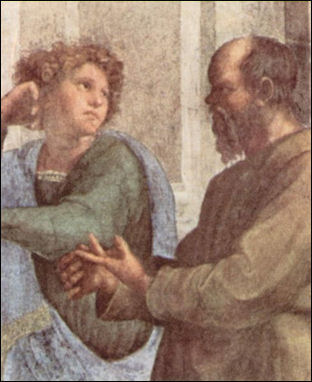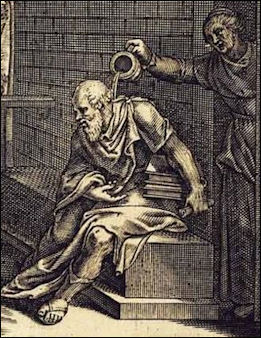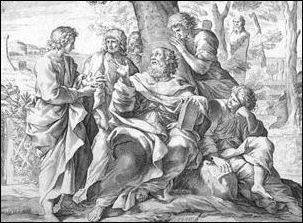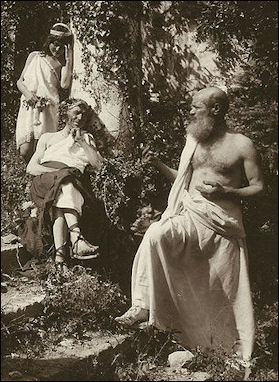Home | Category: Philosophy
SOCRATES

Socrates by Raphael Socrates (470?-399 B.C.) is considered the father of humanistic philosophy, the first person to really apply science to philosophical inquiry, and the founder of the Socratic question-and-answer method of inquiry. The Delphic Oracle described him as the wisest man in Greece. His student Plato said, he was an “an absolute unlikeness to any human being that is or ever was.” His Christlike martyrdom made spoke more loudly than his words and he became the first prophet of philosophy.
Socrates once said, "The sense of wonder is the mark of a philosopher." Socrates left behind no written documents written by himself. Most of what we know about him was written by students such as Plato and Xenophon. Aristophanes and Aristotle also wrote about him and much of what they had to say about him reflected their views rather than accurate assessment of what Socrates was really like. Some of the most telling details about Socrates’s life came out during his trial.
"I have heard Pericles and other great orators," says a character in Plato's “ Symposium” . "But...my soul was not stirred by them, nor was I angry at the thought of my own slavish state...he [Socrates] make me confess that I ought not to live as I do, neglecting the wants of my own soul."
W. Somerset Maugham latter wrote he was one of the ugliest men of ancient times. He had a "flattened nose and protruding eyes," Maugham wrote, "his thick lips and unwielding belly, looked like Silenus."
Socrates, although we have no evidence he ever wrote anything, was the first of the great thinkers of Athens. We can get some understanding of his ideas from the writings of Plato and Xenophon. Socrates challenged the morals and quest for power of his fellow citizens and paid the ultimate price of his life. He is remembered as the father of the study of ethics. [Source: Canadian Museum of History |]
RELATED ARTICLES:
ANCIENT GREEK PHILOSOPHY: HISTORY, PHILOSOPHERS, MAJOR SCHOOLS europe.factsanddetails.com ;
SOPHISTS europe.factsanddetails.com ;
SOCRATES AT A SYMPOSIA europe.factsanddetails.com ;
SOCRATES'S PHILOSOPHIES, IDEAS, DISCUSSIONS AND THE SOCRATIC METHOD europe.factsanddetails.com
SOCRATES' TRIAL, DEFENSE AND DEATH Europe. factsanddetails.com
Websites on Ancient Greece: Internet Encyclopedia of Philosophy iep.utm.edu;Stanford Encyclopedia of Philosophy plato.stanford.edu; Internet Ancient History Sourcebook: Greece sourcebooks.fordham.edu ; Hellenistic World sourcebooks.fordham.edu ; Classics FAQ MIT classics.mit.edu; Lives and Social Culture of Ancient Greece Maryville University online.maryville.edu ; Perseus Project - Tufts University; perseus.tufts.edu ; ; Gutenberg.org gutenberg.org; Illustrated Greek History, Dr. Janice Siegel, Hampden–Sydney College hsc.edu/drjclassics ; Cambridge Classics External Gateway to Humanities Resources web.archive.org/web; Greek History Course from Reed web.archive.org
RECOMMENDED BOOKS:
“Socrates: A Man for Our Times” by Paul Johnson (2012) Amazon.com;
"Conversations of Socrates" (Penguin Classics) by Xenophon , Robin H. Waterfield , et al. Amazon.com;
“The Trial and Death of Socrates” by Plato, John M. Cooper , et al. (2000) Amazon.com;
“Plato: Complete Works” by Plato , John M. Cooper, et al. (1997) Amazon.com;
“How to Think Like Socrates: Ancient Philosophy as a Way of Life in the Modern World” by Donald J. Robertson (2024) Amazon.com;
“The Hemlock Cup: Socrates, Athens and the Search for the Good Life”, Illustrated, by Bettany Hughes (2012), Amazon.com;
“The Greek Sophists” (Penguin Classics) by John Dillon and Tania Gergel (2003) Amazon.com;
“Early Greek Philosophy, Volume VIII: Sophists, Part 1 (Loeb) by André Laks and Glenn W. Most (2016) Amazon.com;
“The First Philosophers: The Presocratics and Sophists” (Oxford World's Classics)
by Robin Waterfield (Translator) Amazon.com;
“Parmenides and Presocratic Philosophy” by John Palmer (2013) Amazon.com;
“The Sophists” (Reprint Edition) by W. K. C. Guthrie (1906-1981) Amazon.com;
“Ancient Greek Philosophers” by Editors of Canterbury Classics (2018) Amazon.com;
“The Greek Philosophers: From Thales to Aristotle” by William K. Guthrie (1960) Amazon.com;
“Readings in Ancient Greek Philosophy: From Thales to Aristotle” by S. Marc Cohen, Patricia Curd, et al. (2016) Amazon.com;
“Greek Thought: A Guide to Classical Knowledge” by Jacques Brunschwig and Geoffrey E.R. Lloyd (Harvard University Press) Amazon.com;
“The Seekers” by Daniel Boorstin (1998) Amazon.com;
Plato's Accounts of Socrates
Most of what know about Socrates is based on what Plato wrote about him. Plato was Socrates’ number one student. He learned a lot from Socrates about how to think, and what sort of questions to think about. He once said, Socrates was an “an absolute unlikeness to any human being that is or ever was."
Plato left behind a great number of written works, many of which were in the form of dialogues in which Socrates is the leader of the discussions conducted in a Socratic question-and-answer style. In many of Plato's works Socrates is a mouthpiece for Plato's ideas and doctrines. Many of are written in a poetic language with the use of metaphors, parables and symbols.
Socrates's Life

Socrates and Xanthippe The son of a sculptor, Socrates was born in Athens in 469 B.C. into a middle class family. Little is known about his early life. He was probably trained as a sculptor. He served in the army as a hoplite (an armored infantryman) and distinguished himself as a courageous fighter in several battles. One of his companions said, “I was with him in the retreat, and if everyone were like Socrates, our city would never have come to disaster.” He even saved the life of one soldier who later would be one of his primary critics and attackers in Athens.
Socrates was often accused of neglecting his family by his wife Xantippe, who washed clothes for wealthy families to help her family make ends meet. Xantippe has been universally described as a nag and a shrew. One of Socrates’s friends called her “the most troublesome woman of all time.” When he was asked how he could marry such a woman and have three sons with her he said it was a test of his abilities as an instructor and compared himself with a trainer who found it more challenging training a wild horse than a docile one.
While in his 20s, Socrates served on a local council and showed a willingness to go against the status quo to make decisions that he thought were right. He also showed he was willing to stand up for his beliefs — as he did when he condemned the Thirty Tyrants, who seized power from the democrats — even it meant putting his life in danger.
Instead of holding down a regular job Socrates spent his time in the Athens Agora (marketplace) teaching philosophy to anyone who would listen. His charisma,, irony, sense of humor and his method of reasoning attracted a large number of young followers. Xenophon wrote that his former teacher "was always on public view; from early in the morning he used to go to the walkways and gymnasia, to appear in the agora as it filled up, and to be present wherever he would meet with the most people."
Socrates and Plato: Master and Pupil

Socrates and students
Plato was about the age of 19 when he became a student of Socrates. Plato was soldier at the time and went to listen to Socrates speak a war had ended. Plato remained faithful to Socrates until his death in 399 B.C. According to Plato's own account he began his professional life as a dramatist, and wrote a few tragedies, but gave all that up and even burned his manuscripts when he met Socrates
The master- pupil relationship between Socrates and Plato lasted about ten years and was a decisive influence in Plato's philosophical career. Before meeting Socrates he had, very likely, developed an interest in the earlier philosophers, and in schemes for the betterment of political conditions at Athens. At an early age he devoted himself to poetry. All these interests, however, were absorbed in the pursuit of wisdom to which, under the guidance of Socrates, he ardently devoted himself. [Source: Catholic Encyclopedia Article, 1913 |=|]
Plato was about 30 years old when Socrates died in 399 B.C.. He was very upset and began to write down some of the conversations he had heard Socrates have. Practically everything we know about Socrates comes from what Plato wrote down After a while, Plato began to write down his own ideas about philosophy instead of just writing down Socrates‘ ideas.
Socrates's Character and Doubts
Socrates enjoyed good conversation, reading and drinking and disliked work, travel and possessions. He wore the same shabby robe every day and once took up dancing in an attempt to loose weight. He could be both charming and irritating. In “ Apology” , Socrates said, "I am the gadfly which the god had given the state and all day long and in all places am always fastened upon you, arousing and persuading and reproaching you.”

Socrates by
Wilhem von Gloeden Socrates said that he was not a "public" person and he had no interest in politics. In Plato's “ Apology” , Socrates responded to his critics: "Now do you really imagine that I could have survived all these years, if I had led a public life, supposing that...I had always supported the right and had made justice, as I ought, the first thing?"
Socrates repeatedly denied that he was a philosopher or even a teacher. He died claiming to be a midwife. “And like a midwife,” he said, I am barren, and the reproach which is often made against me, that I ask questions of others and have not the wit to answer them myself, is very just — the reason is god compels me to be a midwife, but does not allow me to bring forth.”
Socrates friend Alcibiades admired him because he never appeared drunk and had incredible endurance. He wrote: “one morning I saw him thinking about something which he could not resolve: he would not give it up, but continued thinking from early dawn...until the following morning: and with the return of light, he offered up a prayer to the sun, and went his way.”
Socrates personalized philosophy and questioned assumptions that mankind had about the most basic things. He challenged the Sophist view that truth was unknowable and argued that mankind could use reasoning and the scientific method to ascertain the truth. He sought universal principals through rational thinking and discourse and raising questions that sought at the basis of ethics and knowledge.
Socrates didn't believe in religion or the physical sciences and was suspicious of democracy, insisting that governments should be run by men of knowledge and ability. He believed that logic begot truth and truth in turn provided the foundation of morality and ethics. Socrates never wrote anything, most everything know about him was reported by his student Plato.◂
Aristophanes’ Depiction of Socrates in the Clouds
According to the Internet Encyclopedia of Philosophy: Aristophanes’ play “”The Clouds” depicts the tribulations of Strepsiades, an elderly Athenian citizen with significant debts. Deciding that the best way to discharge his debts is to defeat his creditors in court, he attends The Thinkery, an institute of higher education headed up by the sophist Socrates. When he fails to learn the art of speaking in The Thinkery, Strepsiades persuades his initially reluctant son, Pheidippides, to accompany him. Here they encounter two associates of Socrates, the Stronger and the Weaker Arguments, who represent lives of justice and self-discipline and injustice and self-indulgence respectively.

On the basis of a popular vote, the Weaker Argument prevails and leads Pheidippides into The Thinkery for an education in how to make the weaker argument defeat the stronger. Strepsiades later revisits The Thinkery and finds that Socrates has turned his son into a pale and useless intellectual. When Pheidippides graduates, he subsequently prevails not only over Strepsiades’ creditors, but also beats his father and offers a persuasive rhetorical justification for the act. As Pheidippides prepares to beat his mother, Strepsiades’ indignation motivates him to lead a violent mob attack on The Thinkery. [Source: Internet Encyclopedia of Philosophy (IEP) ]
“Aristophanes’ depiction of Socrates the sophist is revealing on at least three levels. In the first instance, it demonstrates that the distinction between Socrates and his sophistic counterparts was far from clear to their contemporaries. Although Socrates did not charge fees and frequently asserted that all he knew was that he was ignorant of most matters, his association with the sophists reflects both the indeterminacy of the term sophist and the difficulty, at least for the everyday Athenian citizen, of distinguishing his methods from theirs. Secondly, Aristophanes’ depiction suggests that the sophistic education reflected a decline from the heroic Athens of earlier generations. Thirdly, the attribution to the sophists of intellectual deviousness and moral dubiousness predates Plato and Aristotle.”
See Separate Article: ARISTOPHANES AND ANCIENT GREEK COMEDIES europe.factsanddetails.com
Image Sources: Wikimedia Commons, The Louvre, The British Museum
Text Sources: Internet Ancient History Sourcebook: Greece sourcebooks.fordham.edu ; Internet Ancient History Sourcebook: Hellenistic World sourcebooks.fordham.edu ; BBC Ancient Greeks bbc.co.uk/history/; Canadian Museum of History, Perseus Project - Tufts University; perseus.tufts.edu ; MIT Classics Online classics.mit.edu ; Gutenberg.org, Metropolitan Museum of Art, National Geographic, Smithsonian magazine, New York Times, Washington Post, Live Science, Discover magazine, Natural History magazine, Archaeology magazine, The New Yorker, Encyclopædia Britannica, "The Discoverers" and "The Creators" by Daniel Boorstin. "Greek and Roman Life" by Ian Jenkins from the British Museum, Wikipedia, Reuters, Associated Press, The Guardian, AFP and various books and other publications.
Last updated September 2024
